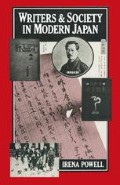Abstract
The major developments in the history of the bundan took place in two great transitional periods in the history of modern Japan. The first, its beginning and end marked by the Sino-Japanese and Russo-Japanese wars, was the period of change between Meiji and Imperial Japan to which the origin of the bundan has been ascribed. The second, its beginning marked by the great Tokyo earthquake in 1923, opened the way to social and political changes which transformed Japan into a modern totalitarian State ready to take her part in the arena of international affairs. It is to this second period that the decline of the bundan may be ascribed. The late Taishō period and the early Shōwa period marked the beginning of the end of the bundan as a closed, sectarian society. This does not preclude the fact that literary critics, writers and publishers talk about the bundan even today: expressions such as the ‘bundan spirit’ or a ‘bundan novel’ or the ‘bundan hierarchy’ still appear in literary jargon. But what they refer to are the qualities which constituted the essence of the pre-war bundan— an exclusive society devoted to the theory and practice of the pure novel.
Access this chapter
Tax calculation will be finalised at checkout
Purchases are for personal use only
Preview
Unable to display preview. Download preview PDF.
Notes
Ito Sei, Kyūdosha to ninshikisha (Shinchosha, 1962) p. 169.
Oya Sōichi, ‘Bundan girudo no kaitaiki’, in Showa hihyō taikei, vol.1(Bancho Shobo, 1974) pp. 348–52.
B. Crick, In Defence of Politics ( Harmondsworth: Penguin Books, 1964 ) p. 40.
Hidaka Rokuro, ‘Bundan to jarunarizumu’ inBungaku Iwanami kōza, vol. 2 (Iwanami, 1952).
Togaeri Hajime, ‘“Bundan” hokai ron’, inShōwa hihyō taikei, vol. 4, (Bancho Shobo, 1974) pp. 84–5.
Copyright information
© 1983 Irena Powell
About this chapter
Cite this chapter
Powell, I. (1983). Decline. In: Writers and Society in Modern Japan. St Antony’s/Macmillan Series. Palgrave Macmillan, London. https://doi.org/10.1007/978-1-349-05028-4_7
Download citation
DOI: https://doi.org/10.1007/978-1-349-05028-4_7
Publisher Name: Palgrave Macmillan, London
Print ISBN: 978-1-349-05030-7
Online ISBN: 978-1-349-05028-4
eBook Packages: Palgrave Social & Cultural Studies CollectionSocial Sciences (R0)

